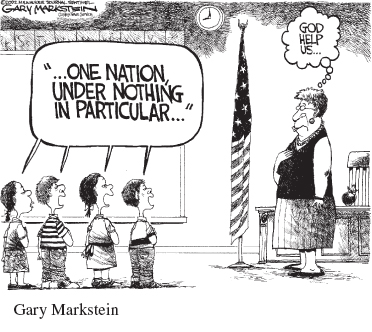JACKSON SMITH
Pledging Nothing? (Student Essay)
Gary Markstein’s cartoon about the Pledge of Allegiance is one of dozens that can be retrieved by a search engine. It happens that every one of the cartoons that I retrieved mocked the courts for ruling that schools cannot require students to recite the Pledge of Allegiance in its present form, which includes the words “under God.” I personally object to these words, so the cartoons certainly do not speak for me, but I’ll try as impartially as possible to analyze the strength of Markstein’s cartoon.
Markstein shows us, in the cartoon, four schoolchildren reciting the Pledge. Coming out of all four mouths is a speech balloon with the words, “One nation under nothing in particular.” The children are facing a furled American flag, and to the right of the flag is a middle-aged female teacher, whose speech balloon is in the form of a cloud, indicating that she is thinking rather than saying the words, “God help us.”
Certainly the image grabs us: little kids lined up reciting the Pledge of Allegiance, an American flag, a maternal-looking teacher, and, in fact, if one examines the cartoon closely, one sees an apple on the teacher’s desk. It’s almost a Norman Rockwell scene, except, of course, it is a cartoon, so the figures are all a bit grotesque — but, still, they are nice folks. What is not nice, Markstein says, is what these kids must recite, “One nation under nothing in particular.” In fact, the cartoon is far from telling the truth. Children who recite the Pledge without the words “under God” will still be saying that they are pledging allegiance to something quite specific — the United States:

I pledge allegiance to the flag of the United States of America, and to the Republic for which it stands: one nation indivisible, with Liberty and Justice for all.
That’s really quite a lot, very far from Markstein’s “under nothing in particular.” But no one, I suppose, expects fairness in a political cartoon — and of course this cartoon is political, because the issue of the Pledge has become a political football, with liberals on the whole wanting the words “under God” removed and conservatives on the whole wanting the words retained.
Let’s now look at some of the subtleties of the cartoon. First, although, as I have said, cartoons present grotesque caricatures, the figures here are all affectionately presented. None of these figures is menacing. The teacher, with her spectacles and her rather dumpy figure, is clearly a benevolent figure, someone who in the eyes of the cartoonist rightly is disturbed about the fate of these little kids who are not allowed to say the words “under God.” (Nothing, of course, prevents the children from speaking about God when they are not in the classroom. Those who believe in God can say grace at mealtime, can go to Sunday School, can go to church regularly, can pray before they go to bed, etc.) Markstein suggests that the absence of these words makes the entire Pledge meaningless (“under nothing in particular”), and in a master stroke he has conveyed this idea of impoverishment by showing a tightly furled flag, a flag that is presented as minimally as possible. After all, the flag could have been shown more fully, perhaps hanging from a pole that extended from a wall into the classroom, or the flag could have been displayed extended against a wall. Instead we get the narrowest of flags, something that is not much more than a furled umbrella, identifiable as the American flag by its stripes and a few stars in the upper third. Markstein thus cleverly suggests that with the loss of the words “under God,” the flag itself is reduced to almost nothing.
5 Fair? No. Effective? Yes, and that’s the job of a cartoonist. Readers probably give cartoons no more than three or four seconds, and Markstein has made the most of those few seconds. The reader gets his point, and if the reader already holds this view, he or she probably says, “Hey, here’s a great cartoon.” I don’t hold that view, but I am willing to grant that it is a pretty good cartoon, effectively making a point that I think is wrong-headed.